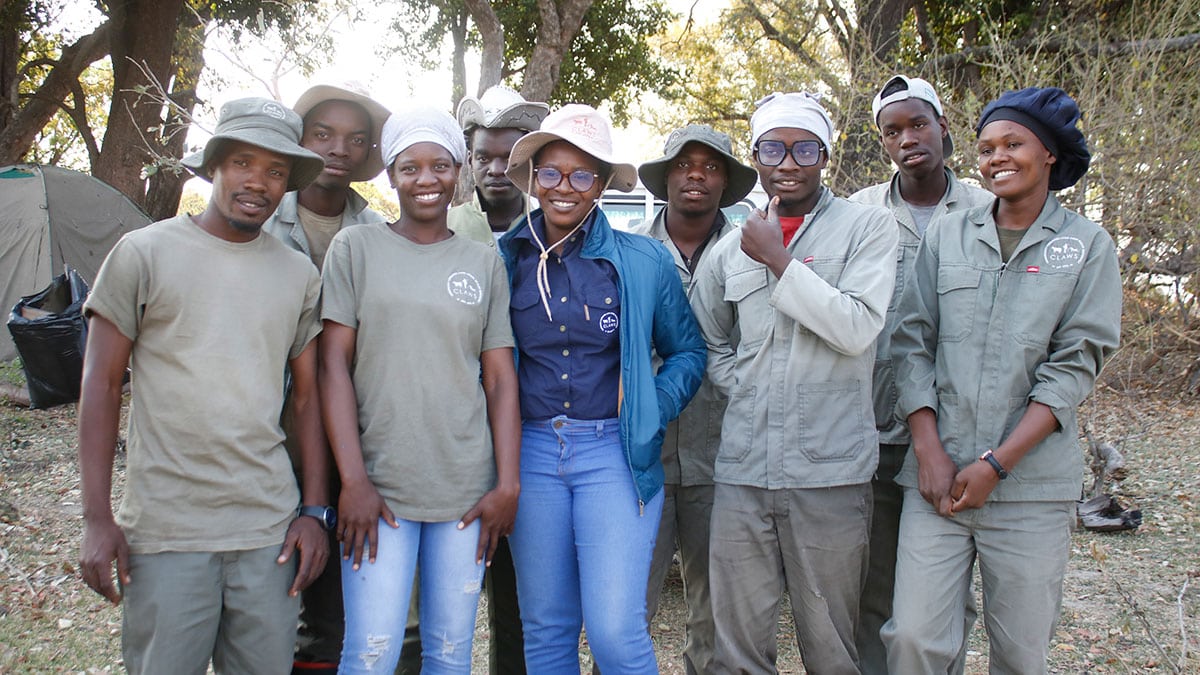Female cattle herder leads Okavango East communal herding with resilience.
A native of the charming and picturesque but remote village of Gonotsoga where abundant wildlife roam freely, growing up Kelebogile Motshoi dreamt of one day becoming an accountant in a big corporation in the city.
However, fate would have it differently.
Although she was one of the few residents of this village who passed their high school exams and got admitted in a University in Gaborone to study accounting, 32- year -old Motshoi’s dreams festered and died when she became too ill to study and was forced to return home as an invalid.
Faced with a bleak future because of her limited education and very little prospects of paid employment in the remote village, the young woman was grateful when an opportunity to join Herding for Health, an Initiative by Conservatory Communities Living Among Wildlife, (CLAWS), a non- governmental Organisation seeking to curb poisoning of lions by farmers in retaliation, presented itself in 2020.
The brawny job of herding cattle is traditionally a man’s job in the Okavango region because of the dangers involved, especially in this tricky terrain where wildlife fiercely competes for resources with humans.
Motshoi however has completely embraced the inconvenience of a semi- nomadic life of looking after communal herds that move around for rotational grazing to preserve the environment.
She has also come to accept and be prepared to face the danger that lies in the jungle where daring big cats don’t back down when they have identified their prey.
“Lions in this area are extremely bold and daring. A hungry pride does not hesitate to hunt cattle that are under the care of six unarmed herders. The lions simply launch an attack by scattering the cattle before they identify their prey, go for a kill and begin to eat while the herders often watch helplessly” says Saushuko Sivambo, a frustrated farmer who says he has lost over 100 cattle to tick borne diseases and many others to lions.
Given the above scenario, Motshoi’s feminine frame is obviously no match for a hungry lion, but she is confident that the training that she and her team have received from CLAWS so far is good enough to keep both them and the cattle that they are entrusted with safe.

“We have been taught how to behave when we are under attack from a hungry pride of lions. Each of the bomas or Kralls that I supervise is staffed with six herders at a time, CLAWS has bought us solar panels for lights to let the lions know that there are humans in the territory, we also keep dogs, but more importantly we have technology that reports the presence of lions to our phones within a distance of 1.1 kilometres to 5 kilometres so that we can start to scare them away by making noise or call for backup if we have to,” explains Motshoi adding that since she took over the leadership of the project she has lost only one cow and that is because it was outside the Krall at night.
The brave woman’s job entails waking up at the crack of dawn to check on her herders, to make sure they are well and fit for the job.
The staff then inspect the cattle for any sign of sickness and if there is any animal that is unwell, they refer it to the veterinarian before four of their herders go out with the rest of the cattle to the bush while two stay on camp to cook and to keep guard.
Although cattle herding was not Motshoi’s original choice of career, the young woman has come to cherish it and begin to build her dreams and future around it.
Explaining how she landed the job she describes as ‘fulfilling and empowering, but demanding’, Motshoi says, “It’s only a few of us who finish form five in this village so being one of those few privileged ones, I, like other people from various parts of the country trekked to the capital city to pursue college education to become an accountant. However, I became too sick and was therefore forced to return to the village. There was nothing much to do here but CLAWS was conducting public education on conservation, and I developed a keen interest in their work. My active participation caught management’s attention and they offered me a job as a supervisor cattle herder.”
Since joining the project three years ago just before Covid -19 hit, Motshoi has risen to supervise a team of 21 herders taking care of about 500 cattle in three neighboring villages of Gonotsoga, Ndorotsha and Eretsha.
She has also become a role model, inspiring young women to join her team.
So far, we have three other women herders and plenty of applications from women for new positions to be filled soon and I’ll definitely make sure that they are given a priority because while men can easily get employment outside the village as security guards and laborer’s, women in this area carry the burden of being primary caregivers for children and old people and are therefore ideal candidates for local jobs.
“This project has given me hope for a better future. I have already been sent to school in the Eastern Cape in South Africa to study land management and my plans are to become a cattle farmer of note, including my own herd in the communal herd and becoming part of the farmers from the red zone that can sell foot and mouth free, quality beef to Botswana Meat Commission.”








